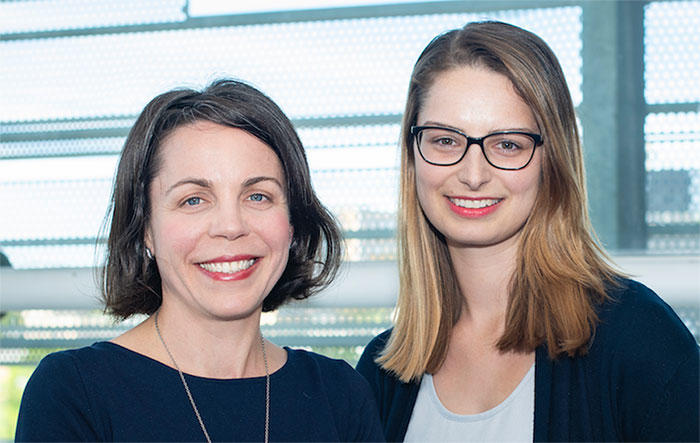Alternative cells-of-origin influence the heterogeneity of KRAS-mutant lung adenocarcinoma
, by Sarah Best and Kate Sutherland
Dr. Kate Sutherland heads a research laboratory at The Walter and Eliza Hall Institute of Medical Research, where her research program focuses on understanding the drivers of heterogeneity in lung cancer. Dr. Sarah Best is a Senior Postdoctoral Fellow in the Sutherland Laboratory and led the recent work that discovered a role for the cell-of-origin in shaping the immune microenvironment of KRAS-mutant tumors.
KRAS-mutant lung adenocarcinomas, accounting for 30% of non-small cell lung cancers, exhibit a high level of heterogeneity with emerging clinical significance (1). While tumor heterogeneity can be influenced by genetic and/or epigenetic alterations co-occurring with KRAS, heterogeneous tumor subsets can also be the product of differing cells-of-origin (2). Genetically engineered mouse models based on the spatial and temporal activation of oncogenic Kras, pioneered by David Tuveson and Mariano Barbacid, have been instrumental in addressing these questions. Indeed, the observation that most tissues, with the exception of the lung, are resistant to KrasG12V oncogenic signals (3), highlights an exquisite cell type dependency of oncogenic Kras-driven transformation. In 2005, Carla Kim and colleagues proposed that a rare cell type located at the junction between and bronchiolar and alveolar epithelium served as the cancer-initiating cell of KrasG12D-induced lung cancer (4). Intrigued by these findings, we established a project at the Netherlands Cancer Institute (NKI) in Anton Berns’ group aimed at definitively identifying the cellular origins of the disease. This led to the generation of a series of recombinant adenoviruses that have the ability to switch oncogenes “on” and tumor suppressor genes “off” specifically in bronchiolar Club (Ad5-CC10-Cre), alveolar type 2 (Ad5-SPC-Cre) and pulmonary neuroendocrine (Ad5-CGRP-Cre) cells in the adult mouse lung (5). Delivery of these cell type-restricted viruses to the lungs of KrasLSL-G12D/+ mice identified alveolar type 2 (AT2) cells as the predominant cell-of-origin of KrasG12D-induced lung adenocarcinoma (6). In parallel, utilizing independent approaches, the labs of Mariano Barbacid and Bridget Hogan confirmed these findings (7,8), supporting the idea oncogenic Kras is highly dependent on cellular context.
KRAS-mutant patient and murine lung adenocarcinomas are classically inflamed with macrophages (9). While originally hypothesized as the result of an enhanced inflammatory signal, we recently discovered that the cell-of-origin is essential in macrophage expansion (10). Alveolar macrophages reside in alveolar spaces and play a key role in immune tolerance in the lung. Critically, alveolar macrophages interact with AT2 cells via Connexin-43 (Cx43), a gap junction channel that mediates intercellular communication between immune and epithelial cells that is essential for immune tolerance (11). Cx43 is highly expressed on AT2 cells, and both patient and murine KRAS-mutant lung adenocarcinomas contain the gene expression fingerprint of normal AT2 cells (10). Importantly, we showed that restricted expression of KrasG12D in bronchiolar cells (CC10+) results in the formation of adenocarcinomas lacking macrophage infiltration. Together, these findings revealed for the first time that the cell-of-origin can also directly influence the immune phenotype of the resulting tumor, based on epithelial-immune cell interactions at play in non-transformed cells.
Though we forced a bronchiolar cell-of-origin to alter the immunophenotype in these studies, KRAS-mutant lung adenocarcinoma can sporadically arise from bronchiolar cells given the nature of co-occurring mutations. In parallel, we have investigated a subset of KRAS-mutant lung adenocarcinoma co-mutant for KEAP1, a key regulator of the NRF2 oxidative stress-response pathway (12). Lung adenocarcinomas with loss of Keap1 invariably arise from a bronchiolar cell-of-origin, likely due to an increased susceptibility of bronchiolar cells to enhanced pathway activity (10,13). Similar to the phenotype seen when KrasG12D expression is restricted to CC10+ bronchiolar cells, Keap1-deficient Kras-mutant mouse tumors and their human counterpart lack macrophage infiltration.
Moving forward, our study argues that the properties of the cancer-initiating cell present a unique opportunity to tailor therapies for KRAS-mutant lung adenocarcinoma. Indeed, we have shown that the alveolar macrophages infiltrating KrasG12D tumors initiated from an AT2 cell-of-origin are pro-tumorigenic, as their depletion significantly reduces tumor progression (10). With inhibitors of KRAS now entering the clinic, combination therapies targeting both the oncogene itself and its cellular dependencies may represent a necessary clinical approach in the near distant future.
